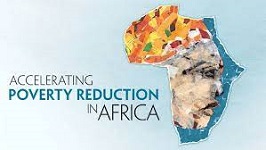African policymakers have recommended strategic policy mandates for the United Nations Economic Commission for Africa (ECA) to support member States in tackling poverty and vulnerability for the COVID-19 recovery and delivering a resilient future for all.
In the face of interlocking global crises, they issued their recommendations on 18 November after the fourth session of the Committee on Social Policy, Poverty and Gender – hosted by ECA on the theme ‘building forward better towards an inclusive and resilient future in the context of COVID-19’.
A fit-for-purpose partner
The mandates will allow ECA to transform into a more fit-for-purpose partner in meeting the needs of member States on tackling poverty and inequality, while addressing gender inequality and unsustainable urbanization over the next two years – ultimately delivering concrete improvements to standards of living for Africans.
With 431 million Africans still living in poverty, policymakers called on ECA to scale up efforts in supporting member countries to address vulnerabilities associated with poverty, while pushing for greater recognition of unpaid work, time poverty and decent youth employment.
They set forth strong recommendations for ECA’s work on strengthening policies for women’s empowerment on areas such as productive entrepreneurship, financial inclusion, reskilling for future jobs, and mentorship for girls in science and technology.
Considering Africa’s rapid urban growth, policymakers, among other suggestions, urged ECA to continue providing technical assistance to member States on prioritizing urbanization in national development planning to leverage the immense potential of urban areas in boosting productivity, job creation and overall social outcomes.
Opportunities ahead
In her closing remarks, Ms. Najla Allani, the committee’s chair and Managing Director of Crédif, Ministry of Family, Women, Children and the Elderly, Tunisia, said: “While the challenges are many, there are considerable opportunities for African countries to address the underlying structural vulnerabilities that made us so vulnerable in the current pandemic.
“We must be better prepared for future shocks. As member States, we have high expectations from ECA on its support to our efforts to address the immediate impacts of the pandemic, but also in ensuring an inclusive and resilient future.”
She called on ECA to fully integrate the session’s recommendations into its work and work closely with the committee’s participants on their implementation.
The session featured intensive discussions among the committee’s participants, which include officials from ministries of gender, youth, finance, urbanization and social policy as well as observers from UN agencies, African intergovernmental bodies and civil society.
During the two-day session, ECA reported on its work carried out in the last two years on poverty, gender and social policy, while seeking the committee’s guidance on the proposed programme plan from 2022 to 2023.
The recommendations will inform the design of policies, products and programmes to be delivered by ECA’s Gender, Poverty and Social Policy Division in the next two years.

